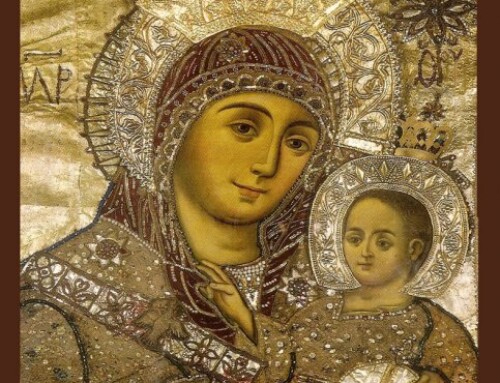Word Magazine February 1963 Page 3/11
FAITH AND GOOD WORKS
By Father Michael J. Buben
Spiritual Adviser
New England Region of SOYO
Did a hungry stranger recently stop at your back door to ask for a sandwich or a cup of coffee? Did you slam the door in his face? Did you burn a coat or suit or shoes recently or throw anything away which might have yet clothed someone less fortunate than you? Did you pass a bleeding drunk in the gutter without offering aid? Did you forget to visit a sick friend recently? Did you curse anyone who came to you seeking some form of aid or comfort? Did you laugh when brother John was jailed or did you visit him as yet? Did you attempt to bring comfort to the new widower in your neighborhood? Did you forget to put money in the last envelope you gave to church? Did you go to church last Sunday? Have you been to Communion the past year? If so — read on. If not — read on.
Faith
Saint Paul tells us that: “Faith is the substance of things hoped for, the evidence of things not seen.” (Heb.10,1). Faith is a trust in the unseen, as though it were seen, in that which is hoped and waited for, as if it were present. “Faith,” says St. Cyril of Jerusalem, “is the eye which enlighteneth every man’s conscience; it giveth man knowledge.” “For” as proclaims the prophet Isaiah, “if ye will not believe, ye shall not understand.” (7,9).
Faith is the first necessary indispensable condition for our vindication; it is the beginning of man’s salvation, and the leaven for all justification. “Without faith it is impossible to please God.” (Heb. 11,6). “By grace are ye saved through faith.” (Eph. 2,8). “Whatsoever is not of faith is sin.” (Rom. 14,23).
Faith consists not only in believing without incredulity, that the grace of God helps the theist in Christ to overcome sin; but it also consists of the sincere acceptance of all the revealed truths as expounded and interpreted by our Holy Orthodox Catholic Church. It is especially desideratum to believe that God is a Merciful Father and preeminent judge of all. “He that cometh to God must believe that He is, and that He is a rewarder of them that diligently seek Him.” (Heb.11,6).
It is also essential to believe in the mysteries of the Holy Trinity and the Incarnation. “And this is life eternal, that they might know Thee the only true God, and Jesus Christ, whom Thou hast sent.” (St. John 17,3). “For if ye believe not that I am He, ye shall die in your sins.” (St. John 8, 24). “For there is none other Name under heaven given among men, whereby we must be saved.” (Acts 4,12).
Indispensability of Good Works
Faith without Good Works is not enough for salvation. “Faith without works is dead.” (St. James). It is necessary for the faithful theist to perform good works. “By works a man is justified, and not by faith alone.” (St. James 2,24).
St. John Chrysostom, the great Syrian Orthodox Saint, had this to say about the necessity of good works and a holy life for salvation: “neither baptism, neither the forgiveness of sins, neither knowledge, neither participation in the Sacraments, neither the Holy Sacrifice, neither eating the Flesh of Christ, neither drinking the Blood, and neither anything else of such substance can bring us any purpose, if we do not live a life of truth and honor — clean from sin.”
Faith and Good Works As
Condiments for Eternal Life
In quite an amount of contemporary methodics of exogenous education, the moral, ethical, and practical values and interpretation of faith and good works are confused, obliterated, indistinct, and at times a false rationality dominates. Some views elevate faith to the level of good works and then disperse completely with faith. Other views attempt to hide faith in the realm of good works, bearing witness to modern educational shortsightedness in a live comprehension of Holy Scripture. This is proclaimed by St. James: “What doth it profit my brethren,” he writes, “though a man say he hath faith, and have not works? Can faith save him?”
There are three forms of Scriptural faith: a dead faith which cannot give eternal life: the faith of demons, consisting of fear and trembling; and finally a living faith which is active, and united with love, brings to us eternal salvation. Here we can picture faith as the roots, our good works as the tree, and salvation as the fruit. In this light, salvation is our good-willed justification before God.
Through faith, and the redeeming grace of our Lord Jesus Christ, good works help to compose a symphony of merits by which a Christian is enabled to be regenerated and reunited with his heavenly Father. This is why the righteous of the New Testament received their crowns and later became partakers of blessedness eternal. For the accomplishment of salvation, certain measures are necessary in our thoughts, intentions, and deeds. Our salvation becomes a conquerors medal, which God the Father awards to every worker who listens to His Only-begotten and beloved Son; even if the worker comes to Him during the eleventh hour.
Faith alone, cold and dead is not enough. Only a living, active faith portrayed in moral good works saves us. All our good works should be the fruit of our faith. Where good Christian deeds do not exist, there, without question, exists not the true Christian faith. Where there is a good Christian life, there naturally is the true Christian faith. “Every good tree bringeth forth good fruit,” says our Lord Jesus Christ, “but a corrupt tree bringeth forth evil fruit.” “Not everyone that saith unto me, Lord, Lord shall enter into the kingdom of heaven; but he that doeth the will of my Father which is in heaven.” (Matthew 7,21).
Faith and good works compose the weapons given to mankind to work out his regeneration and redemption. “For we are His workmanship, created in Christ Jesus unto good works, which God hath before ordained that we should walk in them.” (Eph. 2,10).
Salvation Impossible Through Faith Alone
Some Protestants teach that mankind can justify itself before God through faith alone. The Orthodox Catholic Church, guided by Holy Scripture, proclaims that we must perform good works to show our faith. Without good works there can be no salvation or justification before God.
“Whosoever will come after me, let him deny himself, and take up his cross, and follow me.” i.e. who would follow Christ should imitate His redeeming work with patience. Christ said. “Keep my Commandments,” in answer to the question of the Jewish boy who asked how we were to obtain salvation. In the parable of Talents, it is clear that we are rewarded not only for our faith, but also for our trials and tribulations. (St. Matthew 25,14-30). The servant who received one Talent had faith, but he was punished because he did not use his talent because of laziness. Those who received two and five talents were greatly rewarded, because they used the talents through all sort of trials and tribulation.
You as parishioners should especially show your good faith by good works for your parish. Too many hide their talents under a bushel. Many good singers never join the choir. Many good business men never serve on the Board of Trustees. Many school teachers refuse to teach Sunday School. Where is their faith?
“Let your light so shine before men, that they may see your good works, and glorify your Father which is in heaven.”


